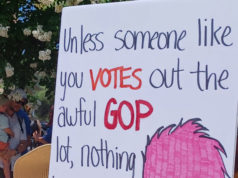Willie has become the weathered face of biodiesel, which is starting to catch on as an alternative fuel for motorists with diesel engines. Clean-burning biodiesel, first introduced 100 years ago as an alternative to petroleum-based fuel, is derived from farm products such as soybeans. Even french-fry grease from fast-food joints can be used to make it.
It would be tough to find a better spokesman. Willie handled reporters’ questions with ease and without bullshit. “We need this because we’re going around starting wars over oil,” he said.
Willie is serious about his cause, but he’s a cut-up at heart. When asked if the Bush Administration was endorsing his efforts, Willie noted that the president recently said Americans are “addicted to oil.” Willie admitted to enjoying a few addictions of his own but said foreign oil was one that he’d gladly kick. His humor, however, was occasionally lost on the foreign press. “It is a safe fuel; one night I passed out in the garage with the car running,” he said. The exhaust didn’t kill him but “when I woke up I had gained 10 pounds.” A foreign reporter actually fell for the story, and approached Willie after the press conference for more details. At least that’s what the cute blonde journalist said she was after.
Marfa in the Merlot
Over at the Botanical Research Institute of Texas on Thursday (see Calendar this week), they’ll be talking about one of Static’s favorite people. After all, other than in a World War or II, how often do French people have to admit that their derrieres were saved by a Texan – and in this case, not just their tuckuses, but their wine industry? Thomas V. Munson, born in 1843, loved grapes. Unfortunately, the Denison horticulturist quickly found that though wine grapes grew well in Texas, selective breeding had left the vines vulnerable to diseases.
The same wasn’t true of Texas’ wild grapes, however, so Munson began grafting fancier wine grapes onto the wild stock to take advantage of that disease resistance. That turned out to be important when the grape-root louse (Static’s known a few of those) destroyed 2 million acres of French vineyards in 1887. According to Amanda Neil, BRIT’s head of botanical info, thousands of Munson’s wild Texas grape plants were subsequently shipped to France, where the cultivated wine grape stems were grafted to the Texas root stock, saving the French wine industry. Mon dieu! Sommelier, your best screw-top!











